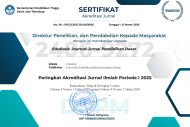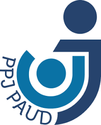Analysis of the Planning Stage of the Natural and Social Sciences (IPAS) Instructional Design Based on Project-Based Learning
Abstract
One of the learning models that involves three domains of learning outcomes (cognitive, affective, and psychomotor) is project-based learning in science subjects. In practice, the application of this model should also not contradict the prevailing curriculum (Merdeka Curriculum). This study aimed to analyse the planning of natural and social sciences (IPAS) instructional design based on the project-based learning (PjBL) model. This research is descriptive qualitative with a case study method. The research participants comprise a teacher, a school principal, and 18 students of the 5th grade. The data were collected through interviews, observations, and documentation. The data analysis technique used was Milles & Huberman's interactive analysis. The researchers applied data validity test with triangulation of sources, techniques, and theories. The results of the study suggested that the planning of teaching modules based on the project-based learning model created by the teacher considered students’ learning achievements in line with the demands of the Merdeka Curriculum in terms of syntaxes of the project-based learning. The results imply that teachers need to design systematic project stages, provide adequate resources, and provide space for collaboration and student creativity, and a rubric for assessing students' processes and outcomes in the planning stage of the IPAS instructional design based on project-based learning consistently in the future.
Keywords
Full Text:
PDFReferences
Abdelrahman, G., & Wang, Q. (2023). Learning data teaching strategies via knowledge tracing. Knowledge-Based Systems, 269(2), 110511.
Aldila, F. T., & Rini, E. F. S. (2023). Teacher’s strategy in developing practical values of the 5th Pancasila precepts in thematic learning in elementary school. Journal of Basic Education Research, 4(1), 31–38.
Ali, A. (2021). Lesson planning and proactive classroom management strategies for teaching english at tertiary level in Pakistan. Elsya : Journal of English Language Studies, 3(1), 8–16.
Allen, S. A., & Gardner, J. L. (2021). Project management competencies in instructional design. Online Journal of Distance Learning Administration, 24(2), EJ1311023.
Alpi, K. M., & Evans, J. J. (2019). Distinguishing case study as a research method from case reports as a publication type. Journal of the Medical Library Association, 107(1), 1–5.
Andreani, D., & Gunansyah, G. (2023). Persepsi guru sekolah dasar tentang mata pelajaran IPAS pada Kurikulum Merdeka. Jurnal Penelitian Pendidikan Guru Sekolah Dasar, 11(9), 1841–1854.
Anggraeni, S. A., & Nurazizah, S. (2024). Konsep dasar perencanaan pembelajaran. Karimah Tauhid, 3(5), 5548–5562.
Anisah, A. S., Widiyastuti, R., Mubarokah, G., & Istiqomah, I. (2023). Posisi mata pelajaran IPA dan IPS dalam kurikulum merdeka di sekolah dasar. Jurnal Tunas Pendidikan, 6(1), 196–211.
Apriyanti, H. (2023). Penyusunan perencanaan pembelajaran pada kurikulum merdeka. Education Journal : Journal Educational Research and Development, 7(1), 15–20.
Ardianti, Y., & Amalia, N. (2022). Kurikulum Merdeka: Pemaknaan merdeka dalam perencanaan pembelajaran di sekolah dasar. Jurnal Penelitian dan Pengembangan Pendidikan, 6(3), 399–407.
Arifudin, O., & Ali, H. R. (2022). Teacher personality competence in building the character of students. International Journal of Education and Digital Learning (IJEDL), 1(1), 5–12.
Azubike, N. O. (2021). Lesson plan and the relevant teaching skills as instrument for effective teaching practice. International Journal of Progressive and Alternative Education, 7(1), 1–15.
van den Berg, G., & du Plessis, E. (2023). ChatGPT and Generative AI : Possibilities for its contribution to lesson planning, critical thinking and openness in teacher education. Education Sciences, 13(10), 998.
Cevikbas, M., König, J., & Rothland, M. (2024). Empirical research on teacher competence in mathematics lesson planning : Recent developments. ZDM – Mathematics Education, 56(1), 101–113.
Choirudin, C., Sugianto, R., Darmayanti, R., & Muhammad, I. (2023). Teacher competence in the preparation of test and non-test instruments. Journal of Teaching and Learning Mathematics, 1(1), 25–32.
Christoforidou, M., & Kyriakides, L. (2021). Developing teacher assessment skills: The impact of the dynamic approach to teacher professional development. Studies in Educational Evaluation, 70, 101051.
Estiani, S. W., & Hasanah, E. (2022). Principal’s leadership role in improving teacher competence. Nidhomul Haq : Jurnal Manajemen Pendidikan Islam, 7(2), 229–241.
Farhang, Q., Hashemi, S. S. A., & Ghorianfar, S. M. (2023). Lesson plan and its importance in teaching process. International Journal of Current Science Research and Review, 6(8), 5901–5913.
Guo, P., Saab, N., Post, L. S., & Admiraal, W. (2020). A review of project-based learning in higher education : Student outcomes and measures. International Journal of Educational Research, 102, 101586.
Ibragimovich, I. K., Kholboevna, I. F., Amrilloevich, I. A., & Rakhmonovich, U. S. (2021). Pedagogical abilities of a teacher: Structure and development. Journal of Hunan University(Natural Sciences, 48(12), 2234–2248.
Ilmawan, D. (2024). Implementasi kurikulum merdeka: Pemaknaan merdeka dalam perencanaan pembelajaran di sekolah dasar. Innovative: Journal of Social Science Research, 4(3), 820–828.
Iqbal, M. H., Siddiqie, S. A., & Mazid, M. A. (2021). Rethinking theories of lesson plan for effective teaching and learning. Social Sciences & Humanities Open, 4(1), 100172.
Irawan, M. F., Zulhijrah, Z., & Prastowo, A. (2023). Perencanaan pembelajaran ilmu pengetahuan alam berbasis project based learning pada kurikulum merdeka di sekolah dasar. Pionir: Jurnal Pendidikan, 12(3), 38–46.
Koesnadi, L. P., & Astuti, R. (2024). Analisis kesesuaian dan kelengkapan modul ajar terhadap standar kompetensi microteaching. Journal of Education Research, 5(4), 5479–5487.
König, J., Heine, S., Jäger-Biela, D., & Rothland, M. (2024). ICT integration in teachers ’ lesson plans : A scoping review of empirical studies empirical studies. European Journal of Teacher Education, 47(4), 821–849.
König, J., Krepf, M., Bremerich-Vos, A., & Buchholtz, C. (2021). Meeting cognitive demands of lesson planning: Introducing the CODE-PLAN Model to describe and analyze teachers’ planning competence. Teacher Educator, 56(4), 466–487.
Kurniastuti, D., Kumalasari, I. D., Nawati, A., & Nisa, A. F. (2023). Analisis penerapan kurikulum merdeka dengan model project based learning pada pembelajaran IPAS di sekolah dasar. Pendas : Jurnal Ilmiah Pendidikan Dasar, 8(3), 6249–6262.
Lase, D. (2019). Pendidikan di Era Revolusi Industri 4.0. Jurnal Sunderman, 12(2), 28–43.
Lukman, L., Marsigit, M., Istiyono, E., Kartowagiran, B., Retnawati, H., Kistoro, H. C. A., & Putranta, H. (2021). Effective teachers’ personality in strengthening character education. International Journal of Evaluation and Research in Education, 10(2), 512–521.
Matsumoto-Royo, K., & Ramírez-Montoya, M. S. (2021). Core practices in practice-based teacher education: A systematic literature review of its teaching and assessment process. Studies in Educational Evaluation, 70, 101047.
Mok, S. Y., & Staub, F. C. (2021). Does coaching, mentoring, and supervision matter for pre-service teachers’ planning skills and clarity of instruction? A meta-analysis of (quasi-)experimental studies. Teaching and Teacher Education, 107, 103484.
Mubarok, R. (2022). Perencanaan pembelajaran pada pembelajaran tatap muka terbatas di madrasah ibtidaiyah. Auladuna : Jurnal Prodi Pendidikan Guru Madrasah Ibtidaiyah, 4(1), 15–31.
Muthmainna, A., Siroj, R. A., & Hartatiana, H. (2025). Mastering the art of qualitative data analysis and interpretation: Key steps and procedures. FiHeSu International Journal of Education and Development Research (FIJEES), 2(1), 27–33.
Nguyen, L. T., Kanjug, I., Lowatcharin, G., Manakul, T., Poonpon, K., Sarakorn, W., Somabut, A., Srisawasdi, N., Traiyarach, S., & Tuamsuk, K. (2022). How teachers manage their classroom in the digital learning environment – experiences from the University Smart Learning Project. Heliyon, 8(10), e10817.
Nurtanto, M., Kholifah, N., Masek, A., Sudira, P., & Samsudin, A. (2021). Crucial problems in arranged the lesson plan of vocational teacher. International Journal of Evaluation and Research in Education (IJERE), 10(1), 345–354.
Osiesi, M. P. (2023). Assessment, evaluation and monitoring of teaching and learning in Nigeria primary schools: Challenges and implications for teachers. Utamax : Journal of Ultimate Research and Trends in Education, 5(1), 70–81.
Pender, H.-L., Bohl, L., Schönberger, M., & Knopf, J. (2022). An AI-based lesson planning software to support competency-based learning. International Conference on Higher Education Advances, 8, 1033–1041.
Puspitasari, V., & Wahyuni, A. (2023). Analisis penerapan project based learning (PJBL) pada pembelajaran IPAS Siswa kelas 4 dengan kurikulum merdeka. Pendas: Jurnal Ilmiah Pendidikan Dasar, 8(2), 2517–2530.
Putri, F. A., Akmal, J., & Gusmaneli, G. (2024). Prinsip-prinsip dan teori-teori belajar dalam Pembelajaran. Jurnal Budi Pekerti Agama Islam, 2(2), 332–349.
Putri, Z. P. N. (2024). Komponen dan filosofi perencanaan pembelajaran sekolah dasar. Karimah Tauhid, 3(6), 6376–6396.
Ramadhan, R. (2024). Konsep dasar perencanaan pembelajaran. Karimah Tauhid, 3(4), 4954–4959.
Reinita, R. (2020). Peningkatan hasil belajar tematik terpadu dengan model problem based learning di sekolah dasar. Journal of Moral and Civic Education, 4(2), 88–96.
Rizkianida, R., Wuryandini, E., Suneki, S., & Tunjungsari, D. R. (2023). Penerapan model project based learning pada kurikulum merdeka dalam meningkatkan pemahaman konsep IPAS pada siswa kelas IV SD Negeri Pandeanlamper 1. Jurnal Pendidikan dan Konseling, 5(2), 1450–1456.
Robbani, H. (2022). Coding modeling in qualitative research-case studies. NUCLEUS, 3(1), 37–40.
Rosmana, P. S., Ruswan, A., Putri, A. R., Novitasari, D., Hami, N. B., Salsabhila, U., & Laila, W. N. (2024). Implementasi perencanaan pembelajaran dalam kacamata kurikulum merdeka di sekolah dasar. Jurnal Pendidikan Tambusai, 8(1), 3031–3039.
Rostini, D., Syam, R. Z. A., & Achmad, W. (2022). The Significance of principal management on teacher performance and quality of learning. Al-Ishlah: Jurnal Pendidikan, 14(2), 2513–2520.
Sabrina, N. S., & Sya, M. F. (2024). Konsep perencanaan pembelajaran dan model pengembangan perangkat desain pembelajaran. Karimah Tauhid, 3(4), 5203–5211.
Safitri, R., Alnedral, A., Gusril, G., Wahyuri, A. S., & Ockta, Y. (2024). The impacts of the project-based learning and problem-based learning models with self-confidence on students’ learning outcomes. Indonesian Research Journal in Education (IRJE), 8(1), 269–283.
Saitya, I. (2022). Pentingnya perencanaan pembelajaran pada pelajaran Pendidikan Jasmani Olahraga dan Kesehatan. Jurnal Pendidikan Olahraga, 1(1), 9–13.
Serdianus, S., & Saputra, T. (2023). Peran artificial intelligence ChatGPT dalam perencanaan pembelajaran di era revolusi industri 4.0. Masokan: Ilmu Sosial dan Pendidikan, 3(1), 1–18.
Shabira, Q., Baharudin, & Yanti, Y. (2024). Mapping the literature of technological pedagogical and content knowledge (TPACK) in elementary education: A bibliometric review. Jurnal Penelitian Pendidikan IPA, 10(9), 631–643.
Suhartini, S., Insani, N. N., Bahri, B., & Subair, S. (2024). Planning learning activities (assessment). JICN: Jurnal Intelek dan Cendikiawan Nusantara, 1(5), 7872–7879.
Sumandya, I. W., Widana, I. W., Suryawan, I. P. P., Handayani, I. G. A., & Mukminin, A. (2023). Analysis of understanding by design concept of teachers’ independence and creativity in developing evaluations of mathematics learning in inclusion schools. Edelweiss Applied Science and Technology, 7(2), 124–135.
Sumarni, W., & Kadarwati, S. (2020). Ethno-STEM project-based learning: Its Impact to critical and creative thinking skills. Jurnal Pendidikan IPA Indonesia, 9(1), 11–21.
Umamah, N., Sumardi, S., Marjono, M., Surya, R. A., & Muffida, E. (2021). Teachers’ ability analysis of developing innovative instructional design. IOP Conference Series: Earth and Environmental Science, 747, 012070.
Vhalery, R., Setyastanto, A. M., & Leksono, A. W. (2022). Kurikulum merdeka belajar kampus merdeka: Sebuah kajian literatur. Research and Development Journal of Education, 8(1), 185.
Yunus, M., Amirullah, A., Safiah, I., Ridha, S., & Suartama, I. K. (2022). Development of the CPOL design to improve the ability to develop teaching materials. Cypriot Journal of Educational Sciences, 17(5), 1655–1670.
Yustina, Y., Syafii, W., & Vebrianto, R. (2020). The effects of blended learning and project-based learning on pre-service biology teachers’ creative thinking skills through online learning in the COVID-19 pandemic. Jurnal Pendidikan IPA Indonesia, 9(3), 408–420.
Zhang, L., & Ma, Y. (2023). A study of the impact of project-based learning on student learning effects: A meta-analysis study. Frontiers in Psychology, 14(1), 1202728.
Zuhdi, Z., Faridy, F., Baharun, H., Hefny, H., & Fahmi, M. A. (2024). Enhancing learning quality through management support in crafting self-assessment questions at school. Communautaire: Journal of Community Service, 3(1), 1–12.
DOI: https://doi.org/10.17509/ebj.v7i1.82857
Refbacks
- There are currently no refbacks.
Copyright (c) 2025 Universitas Pendidikan Indonesia
This work is licensed under a Creative Commons Attribution 4.0 International License.
This journal is indexed by




.png)




.png)
1.png)


1.png)

.png)